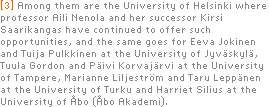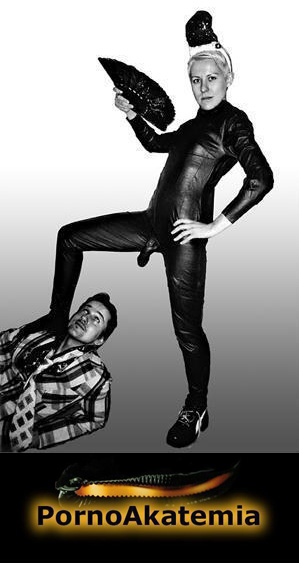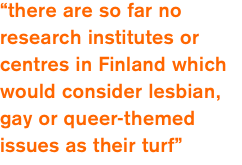| 
|  | | 
While the University of Helsinki has continued to offer teaching informed by lesbian, gay and queer studies from the early 1990s onwards, the supply has not always been so constant at other universities. Since the Finnish university system does not have a tenure track system, even in a fortunate case the contracts for lecturers and even for assistant professors are limited to three to five years. Much shorter contracts are also common due to substituting staff members who are on a leave of absence when having received research funding elsewhere. This makes it virtually impossible to establish a continuous queer perspective in teaching. |  | 
| 
|  |  | The respective women’s studies professors at the Universities of Helsinki, Jyväskylä and Turku have, however, considered queer studies important enough to include them in the core curriculum. This has not necessarily translated into steady teaching positions for queer scholars in those universities, but larger women’s studies centres have been the most likely ones to offer positive backing for lesbian and queer studies by offering facilities for researchers and opportunities for part-time teachers.[3] Nevertheless, Maarit Piipponen, currently a senior lecturer at the Department of English Philology at the University of Tampere, has been successful in offering courses and supervising theses informed by queer studies since 2000. While working on short assignments as a researcher at the University of Tampere, Tuula Juvonen was not in a position to provide that much teaching, but from 2007 onwards she has had a position as a senior lecturer in women’s studies at the University of Jyväskylä, with emphasis on lesbian and queer studies. Piipponen and Juvonen are currently the only lecturers in Finland who have both standing contracts and who are, at the same time, in a position to offer queer courses and to supervise theses. In addition, senior lecturer Leena-Maija Rossi has been successful in establishing herself as a lecturer and a researcher at the University of Helsinki from 2003 to date. Her presence, assisted by a shifting group of other scholars with shorter teaching assignments, has guaranteed a continuous offer of queer courses at the Christina Institute of Women’s Studies. Lasse Kekki has been likewise successful in holding a number of subsequent positions both as a lecturer and a post-doctoral researcher at the University of Turku from the early nineties to 2006. At the same time, he has organised not only several queer courses in the School of Art Studies, but also a string of national conferences in queer studies that have become vital venues for students and scholars alike to present and exchange ideas. In his efforts, Kekki and other Turku-based scholars were able to build upon the work already started by Anu Koivunen in film, television and media studies. Moreover, Matti Savolainen, who earlier worked at the University of Oulu, has now provided support for students working on queer theory in English philology at the University of Tampere for almost 5 years. |  | 
| 
|  |  | Luckily, several more teachers willing and able to help out students in their queer work currently hold at least short-term teaching positions in various universities and disciplines.[4] In addition to this, all universities feature shorter or singular teaching assignments which present at least a queer supplement for the courses otherwise offered, even if the salary in such cases is not enough to cover the cost of living for the teachers. Despite the occasionally unsatisfactory situation in the course supply, a steady flow of students with MA theses informed by queer theory persists, wishing to carry on the work on similar lines towards their PhD theses. However, finding financing for such work can be difficult. Academy of Finland has provided scholarships for some, and in the early 1990s both Jan Löfström and Tuija Pulkkinen were able get grants for their respective PhD studies abroad. In 1995, an arrangement of national Graduate Schools for PhD candidates was established, with a continuous funding of three to four years for those few accepted. Some queer scholars have been able to benefit from this institution, among the first ones Tuula Juvonen, and currently Eva-Mikaela Kinnari at the University of Åbo. Yet most aspiring scholars have to rely on shorter funds from private foundations, if they are not fortunate enough to gain a position in a well-funded research group. Nevertheless, there are currently several exciting doctoral theses in progress at various universities in Finland. The range of topics varies from bisexuality to lesbian mothers and the disciplines from legal studies to Lutheran theology.[5] 
Since the departments at the universities get a significant part of their funding based on the amount of completed PhD theses they have been supervising, universities in turn have a certain interest in supporting PhD candidates in getting funded. The funding landscape turns remarkably rougher, however, when it comes to financing post-doctoral research from which universities benefit less.[6] Consequently, there are no well-functioning established channels for pursuing a post-doctoral academic career in Finland, but everyone is left to her or his own device and academic connections. In this competition, expertise in queer studies seems to be an asset only to a certain extent. |  | 
| 
|  |  | 
|  | | 
|  |  | 
|  |  | 
|  |  | The Academy of Finland currently offers opportunities for two to three years’ post-doctoral funding. Such financing has previously benefited the careers of at least Tuula Juvonen, Lasse Kekki and Jan Wickman. However, after 2005 no queer researcher has received such funding. Academy of Finland also provides funding for larger research projects. Harri Kalha from the University of Helsinki, together with his research group (among them the queer scholars Livia Hekanaho, Jenny Kangasvuo, Antu Sorainen and Annamari Vänskä), was able to gather such funds for his project Porno Academy (2005–2007). The project published a collection of academic articles, organised an international conference and contributed actively to academic and civic discussion on desire, gender and pornography. Tuija Pulkkinen for her part was in 2005 successful in receiving Academy of Finland funding for her Centre of Excellence research group which offered some intellectual and financial backing for the work of Antu Sorainen (on decency) and Tuula Juvonen (on queer politics). Since the watershed year 2005, the funding and positions offered by the Academy of Finland have been unattainable for queer scholars. The only exception is Jan Wickman, who has been able to get a one-year grant for taking up a position as a visiting scholar abroad. In addition to the Academy of Finland, there are a few major foundations which are funding mostly post-graduate students. On the rare occasions when post-doctoral research has been funded, queer scholars have not been the favoured beneficiaries. At the moment, only one scholar applying queer theory, musicologist Susanna Välimäki (University of Helsinki), has a two-year post-doc funding from a Finnish foundation. The funding system of major foundations is currently in a process of reformulation, and it is likely that in the future the stipends will be higher and the social benefits improved. The drawback, however, will be that at the same time there will be less beneficiaries. Some universities, such as Helsinki and Tampere, have established Centres for Advanced Studies which offer positions for distinguished scholars over a period of one to three years. So far Harri Kalha has been the only scholar doing queer work to receive such a position. During his three-year appointment (2002–2005) he finished Tapaus Magnus Enckell [A Case: Magnus Enckell], a historiography of closeting readings of this Swedish-speaking Finnish painter’s work. In addition to this, he published another monograph and several refereed articles each year. After Kalha, no appointments in those centres have been given to scholars working with queer theory. International research collaboration could be one way to solicit EU funding. Jukka Lehtonen and Kati Mustola succeeded in gaining funding for their seminal ESF-funded research project Sexual and Gender minorities at Work (2002–2005). Since such funding remains dependent on annually shifting funding priorities, it offers little security for scholars without back-up positions either in academia or in other research institutes. To make the job market even harsher, there are so far no research institutes or centres in Finland which would consider lesbian, gay or queer-themed issues as their turf, thus making positions as senior researchers unavailable for those PhDs looking for a way to make use of their academic education. Recently, however, the social research centre Stakes has been giving out smaller research projects on queer families to Juha Jämsä and Paula Kuosmanen. |  | 
| 
|  |  | 
|  |  |
|